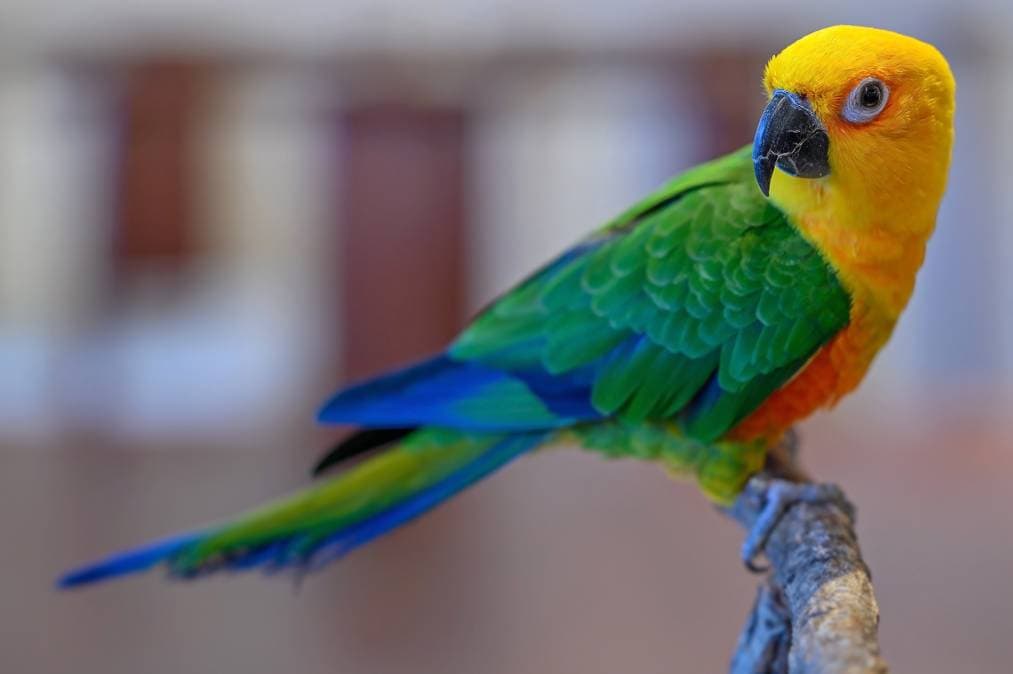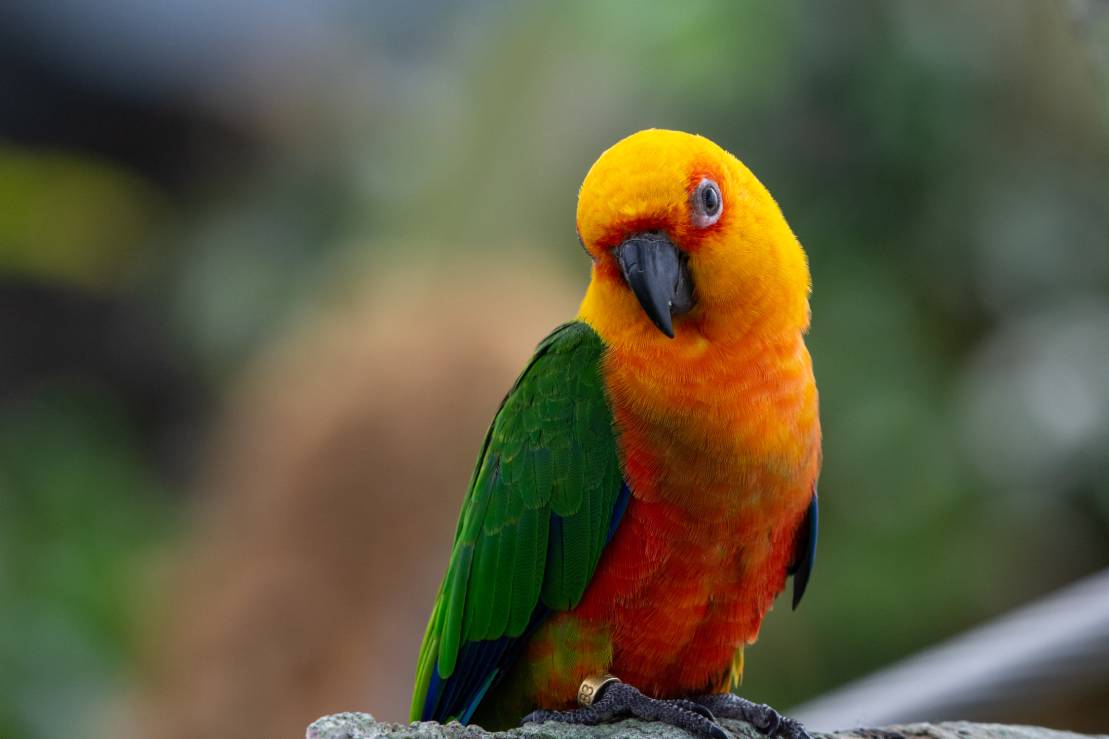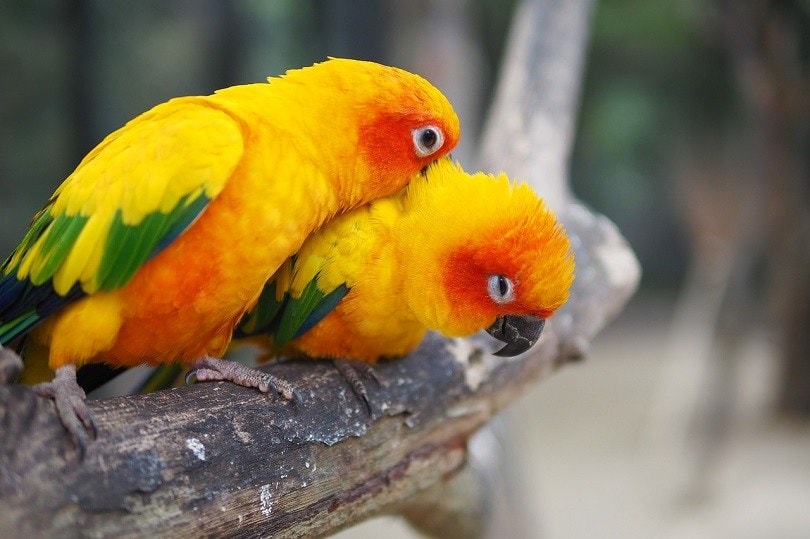
Both the Jenday and Sun Conures are gorgeous birds, and either would make a beautiful addition to your home. They are part of the same genus, Aratinga.
The term “conure” is something of a misnomer, as most scientific literature refers to these birds as parakeets. Regardless, while Jenday and Sun Conures are similar, there are stark differences between the two that can affect their suitability as pets.
This guide goes over how each species differs and what you can expect if you invite one of these birds into your home.
Visual Differences

At a Glance
- Average adult size: Up to 12”
- Lifespan: 30+ years
- Interaction: 1+ hours a day
- Care needs: Intermediate
- Family-friendly: Yes
- Vocal: Moderate
- Trainability: Affectionate, loyal, playful
- Average adult size: 10–13”
- Lifespan: 30+ years
- Interaction: 1+ hours a day
- Care needs: Intermediate
- Family-friendly: Yes
- Vocal: Moderate to loud
- Trainability: Intelligent, playful, eager to please

Jenday Conure Overview

The Jenday or Jandaya Conure prefers the wooded areas of northeastern Brazil. Their alternative name means “small parrot,” which is an appropriate description of this colorful bird. Like many avian species, the Jenday Conure became a popular pet because of the illegal capture and trade of these animals. The government passed the Brazil Wildlife Protection Act in 1967 to protect this bird and many other animals affected by the pet trade.
The Jenday Conure occupies a relatively large range in their native land. They are a social bird that prefers to live in flocks. The International Union for Conservation of Nature (IUCN) lists the Jenday Conure as a species of least concern. Nevertheless, if you move into a new place with an exotic bird, many states require a Certificate of Veterinary Inspection or other documentation, including:
We suggest that you do your homework before moving to a new state. Restrictions often apply to dogs and cats too.
Personality / Character
The social nature of the Jenday Conure makes this bird an excellent choice for a pet—as long as you have the time to spend interacting with them. That’s especially true if you only have one bird. Remember that they typically live in flocks, making this trait a hard-wired one.
As a pet, the Jenday Conure is a playful and affectionate animal. They enjoy being handled, and it’s an excellent way to bond with your parakeet. They’ll thrive on whatever attention you give them. This bird is also intelligent and able to learn a few tricks that can make pet ownership more rewarding.
Housing
A Jenday Conure needs a larger cage than you’d get for a Budgerigar or Canary. We recommend getting one that is at least 3’L x 2’W x 2’H. That will give your pet enough room to stretch their wings without injuring them.
Your pet will also need two or more perches of varying diameters, depending on the size of the cage. By mixing up the pressure points, you will prevent your Jenday Conure from getting sores on their feet. You must also add food and water bowls, along with toys, to keep your pet entertained.
Like other birds of their size, the Jenday Conure has an insatiable desire for chewing. That’s one reason that you must supervise any of their time outside of the cage. Otherwise, these parakeets can be quite destructive. That said, they usually aren’t biters because of their affectionate personalities.
Training
The Jenday Conure is easy to train, which is another reason that they make such a delightful pet. Consistency is the key to building trust and bonding with your pet. Treats are an excellent way to speed up the process. It will also provide the social time that your conure craves.
The Jenday Conure isn’t much of a talker when it comes to learning words. They can whistle and scream if they don’t get enough attention. However, this bird excels when it comes to mimicking sounds in your household, such as the doorbell or a ringtone on your phone.

Health & Care
The single best thing that you can do to ensure the sound health of your Jenday Conure is to put their cage in a draft-free area. Remember that these are neotropical birds that enjoy a warm climate in their native land. This parakeet enjoys a variety of foods, from fruits like mangoes to commercial bird diets.
Social interaction is vital to your Jenday Conure’s health. A neglected pet often develops bad habits, such as chewing, screaming, or even feather plucking. It’s another reason that toys are essential. Overall, Jenday Conures are relatively healthy animals, provided that you feed them a nutritious diet.
We suggest locating a veterinarian who specializes in birds before buying one. Routine health checks can ensure a long life for your feathered friend.
Suitable For:
The Jenday Conure is an excellent segue for individuals and families who want to move on from Budgies. This bird requires daily attention to keep them physically and mentally healthy. While they’re not as loud as some other avian species, they may still not be the best choice for apartment dwellers.
Sun Conure Overview

The main difference between the Sun and Jenday Conures is their color scheme. The former takes after their name with bright yellow plumage on their head and body. Many birds also have a salmon-colored patch by their eyes, offset by a white fleshy ring. Their wings are mottled with a mix of yellow, blue, and green.
It’s a stark contrast from the yellow head, orange body, and green wings of the Jenday Conure. However, some experts believe that the bird is a subspecies of the Sun Conure, making them closer relatives than many might assume.
The Sun Conure is an international traveler, with a range that includes Guyana, northern Brazil, and Venezuela. They also prefer wooded habitats of varying types, including palm groves. They tend to form large flocks of 10 or more birds. However, unlike the Jenday Parakeet, the Sun Conure is an endangered species, according to the IUCN.
Personality / Character
The Sun Conure shares many personality traits with the Jenday Conure. This active bird is quite social with members of their flock, both avian and human. They are also playful and will find ways to amuse themselves. This bird loves attention and can become an affectionate pet.
Like the Jenday Conure, the Sunny won’t tolerate neglect, which can lead to bad habits, especially screaming. The glaring difference between the two birds is that the Sun Conure is much louder when they get upset.
Housing
The cage set-up for the Sun Conure is identical to that for the Jenday Parakeet. The dimensions are the same too. Bear in mind that you’ll need a larger cage if you decide to get more than one bird. The Sunny also needs the usual lineup of bowls, perches, and toys.

Training
The Sun Conure is an intelligent bird. You may find it necessary to get latches for the cage doors if they figure out how they work. This parakeet can learn a few tricks and has a talent for mimicking sounds. Unlike the Jenday Conure, they may pick up a few words.
The Sun Conure also differs from the Jenday Parakeet in that they are sometimes nippy. Their large beak makes getting bit painful. Regular social interaction can curtail this behavior.
Health & Care
Healthcare for the Sun Conure is the same as that for the Jenday Parakeet. Fruits and vegetables will add variety to their diet. You can offer them a commercial mix that will satisfy their needs for seeds and other treats. We also recommend routine veterinary care to ensure your bird’s good health.
Suitable For:
The Sun Conure has the same desire for attention from individuals and families who can provide what they need. Their loud voice makes them unsuitable for apartment dwellers. This a chatty bird that likes to vocalize.
Due to their tendency to bite, the Sun Conure is more appropriate for the experienced bird owner who knows how to handle a nippy pet.

Which Bird Is Right for You?
Several things differentiate the two birds. The Jenday Conure is the quieter of the two species. However, that depends on the amount of attention that you give them. Suffice it to say that either bird is inappropriate if you don’t have the time to spend with them.
The other consideration is behavior. The Jenday Conure is the more easygoing of the two. However, this also depends on the amount of time that you spend with your bird.
Many people adore the color of the Sun Conure over the Jenday Conure. Unfortunately, that also becomes a factor with the price, and you can expect to pay more for that colorful plumage. Either bird can cost several hundred dollars.
Both the Jenday and Sun Conures are affectionate and loyal pets. The best thing is that you can enjoy their company for many years to come.
- Related Read: How Much Does It Cost to Own a Sun Conure? (Price Guide)
Featured image: Top – PAUL ATKINSON, Shutterstock | Bottom – rutpratheep0, Pixabay








